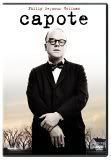
January 8, 2009
Capote (2005)
Should I see it?
Yes.
Yes.
Short Review: The biggest problem with this film is that listening to Capote is like listening to someone scrape a fork on a plate.
The main criteria for who wins the Oscar for Best Actor should always be for the actor who delivers a performance that no one else could have done. They should offer a performance that is unique to them. Tom Hanks as Forrest Gump and Anthony Hopkins as Dr. Hannibal are great examples of this. Over the past few years we have been asked to swallow that good but not great performances were worthy of professional adulation. Gwyneth Paltrow in Shakespeare in Love, or Denzel Washington in Training Day? He loses for Malcolm X but wins for that pedestrian waste? Paaaleese! Philip Seymour Hoffman’s Best Actor win for his performance as Truman Capote returns us to a more proper recipient for this award. Hoffman’s performance is a singular achievement. His Capote is at first a heck of an imitation. He has the voice, the inflection and the gesture down pat. Beyond the mimicry, Hoffman provides a moving look at a brilliant mind injured by a deeply wounding history.
Director Bennett Miller’s work is usually overlooked when people talk about this piece because of Hoffman’s overwhelming performance. Miller gives Hoffman enough space to do his work but also manipulates the story and screen to let us see underneath this complex man. There is never a time when we don’t know that Capote’s hubris is at once well founded but also used by him as an emotional shield. Capote’s aggressive mind offered him the world’s blessings but it also forced him to curse himself at the same time. This duality is handled by Miller brilliantly both by giving Hoffman the ability to express it but also by maneuvering the scenes in such a way that this conflict is constantly at the forefront.
It has been made clear by the filmmakers that this is not an autobiography of Capote. I believe it is. Although you only follow him throughout the five years we was involved in the murders of the Clutter family and their killers, you get such an intimate look into his motivations that the film leaves little else one could possibly get from the rest of his life. One doesn’t need to drink the whole ocean to come to understand its taste. We can gleam much from a person by looking at the actions they take when faced with moral choices. This film follows Capote as he intentionally chooses to do the wrong thing, as he decides the wrong moral choice. He lies to condemned men, he defiles the sanctuary of closed coffins, he uses people and scoffs at their lives when they are away. In short, he was a very bad man who wasn’t far removed from the murderers he worked to popularize.
The film doesn’t condemn Capote’s abuse of those around him openly, but through subtle and intelligent moves it makes it clear his work is not something to be proud of. At one point Capote claims that he will return the killers to the realm of humanity. The scene, in context, is played in such a way that the audience is forced to recall the victims and therefore question if his work will remove them from humanity. Through Capote’s actions and statements, Miller allows the character to condemn himself. The final moments of the film accommodate the need for the film itself to come down with a moral choice in regards to Capote using the tragedy of a quadruple murder for his own gain.
This is a very good film is a brilliant performance at its center. Philip Seymour Hoffman’s performance is as good as you have heard and the film lives up to him. Despite a slight tilt to equating the death penalty to the cold-blooded murder of innocents, this film is very much worth seeing.
Related Reviews:
In Cold Blood (1967)
Infamous (2006)
Other Critic's Reviews:
ReelViews
Quick Reviews
Labels: film, movie review, Philip Seymour Hoffman, Truman Capote
Share
Previous Posts




Good News Film Reviews LLC 2004-2010 - used with permission
Images, video and titles are the property of their respective copyright holders. Good News Film Reviews LLC claims no ownership or connection to them.
The views expressed on this site are not the opinion of any advertiser or external entity.
While we take care to only link to responsible entities, Good News Film Reviews LLC takes no responsibility for the content linked from this site. There are sharks in the waters. Surf at your own risk.
The Template is generated via PsycHo and is Licensed.






















0 Comments:
Post a Comment
<< Home